3D |
The 3D probe is a powerful tool that can be used to visualize electric field, magnetic field, electric current, or air conductivity on the FDTD domain lattice. It is similar to the animation probe, but the 3D probe allows users to visualize volumes and cut planes rather than surfaces.
Click Field
 within the Probes section under the EMA3D tab in the ribbon. Then click 3D Probe in the drop-down list.
within the Probes section under the EMA3D tab in the ribbon. Then click 3D Probe in the drop-down list.
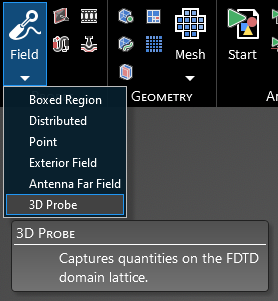
The default probe field type is Electric, suitable to measure the electric field within the chosen region. In order to measure the magnetic field, electric current, or air conductivity, change the probe field type in the Properties Panel. In the Properties Panel, the time properties can also be adjusted. The meaning of each property can be found in the table at the bottom of this page.
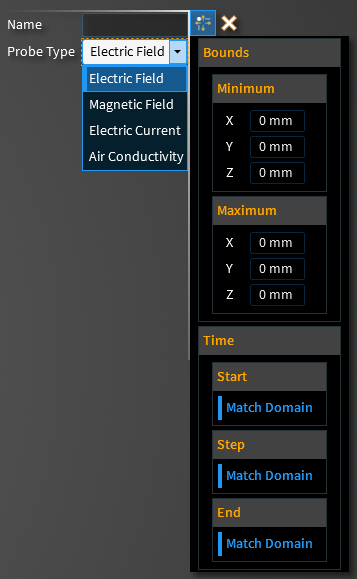
Two options for setting the probe will appear in the top left of the model window.
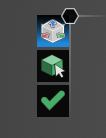
The top, default option
 can be selected to define the boundaries of the 3D probe using a drag box with directional arrows that appears in the model window. To adjust the size and position of the 3D region for the probe drag the red, blue, and green directional
arrows. Alternatively, coordinates of the probe can also be entered manually in the Properties panel. The box can be any dimension (i.e., point, plane, or box).
can be selected to define the boundaries of the 3D probe using a drag box with directional arrows that appears in the model window. To adjust the size and position of the 3D region for the probe drag the red, blue, and green directional
arrows. Alternatively, coordinates of the probe can also be entered manually in the Properties panel. The box can be any dimension (i.e., point, plane, or box).
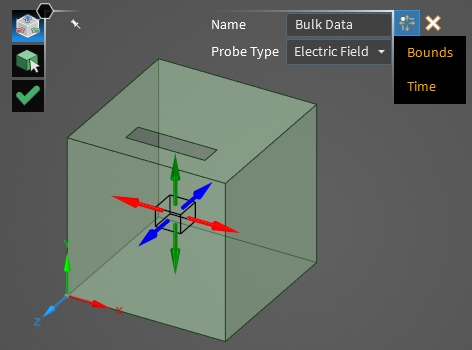
Click OK
 to create the probe. A series of green points will appear indicating the lattice point locations (where probe measurements will be taken) included within the probe boundaries.
to create the probe. A series of green points will appear indicating the lattice point locations (where probe measurements will be taken) included within the probe boundaries.
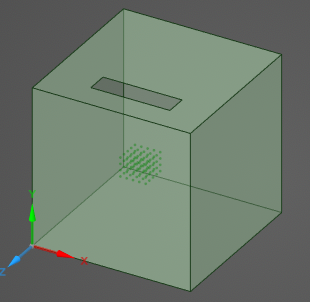
3D probes can also be set to encompass structures. To set a probe using this method, click on the Select Body
 tool in the top left of the model window and then select a component in the structure tree or directly in the model window. The structure will be highlighted when hovered over. Note that the selected probe region must be a volume.
tool in the top left of the model window and then select a component in the structure tree or directly in the model window. The structure will be highlighted when hovered over. Note that the selected probe region must be a volume.
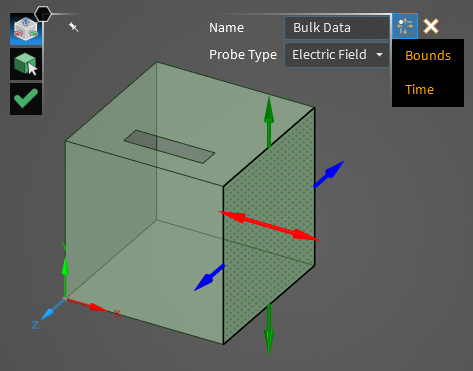
The directional arrows can now be used to further refine the probe. Click OK
 to create the probe. A series of green points will appear indicating the lattice point locations (where probe measurements will be taken) included within the probe boundaries.
to create the probe. A series of green points will appear indicating the lattice point locations (where probe measurements will be taken) included within the probe boundaries.
Click OK
 to create the probe.
to create the probe.
The probe should now be visible in the model window and should be added to the Simulation Tree under the Probes node as Bulk Data Probe.
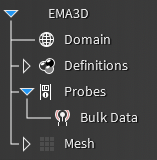
The probe can be edited at any time by right clicking it in the Simulation Tree and selecting Edit from the pop-up menu.
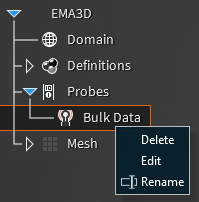
To visualize the 3D Probe results, right click the 3D Bulk Data probe within the Results node in the Simulation Tree and select Visualize 3D.
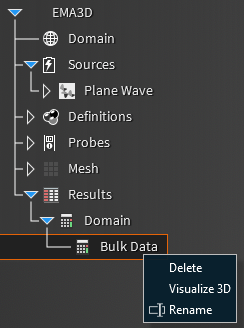
In the pop-up window, select the time step(s) desired and select Visualize Results.
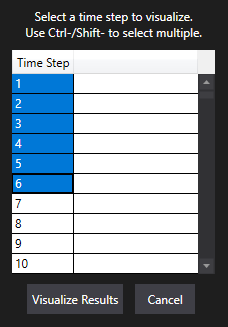
In the bottom right-hand corner of the model window, select the
 Contours button to view the contoured volume. Select the
Contours button to view the contoured volume. Select the  Cut Plane button to view a cut plane through the contoured volume.
Cut Plane button to view a cut plane through the contoured volume.
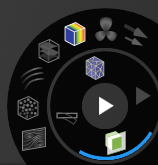
The 3D Probe region will be contoured within the model window.
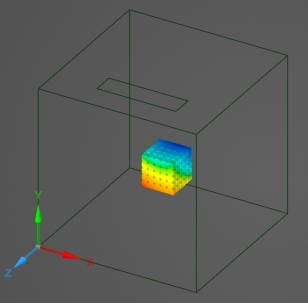
The contours, fields, and time step plotted can be adjusted in the Settings panel that appears at the right side of the model window.
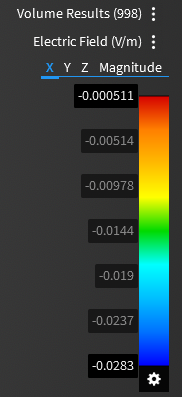
Entry | Meaning |
|---|---|
Field Type | The field quantity to measure. It can be set to Electric Field, Magnetic Field, Electric Current, or Air Conductivity. |
Minimum [mm] | The minimum values (X, Y, Z) for the probe boundaries |
Maximum [mm] | The maximum values (X, Y, Z) for the probe boundaries |
Start [s] | The time the probe starts recording data. The default start time matches the simulation start time. Start can be changed only if the field Match Domain is set to False (White text indicates field set to False, blue text indicates field set to True) |
Step [s] | To which domain to match the probe time step:
|
End [s] | The time the probe stops recording data. The default end time matches the simulation end time. End can be changed only if the field Same as Simulation is set to False |
EMA3D - © 2025 EMA, Inc. Unauthorized use, distribution, or duplication is prohibited.